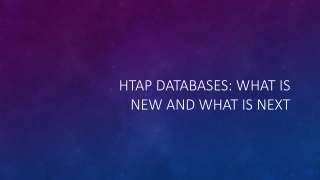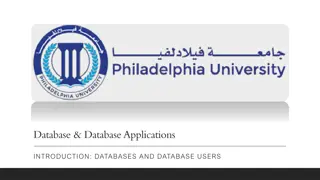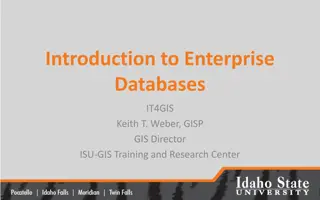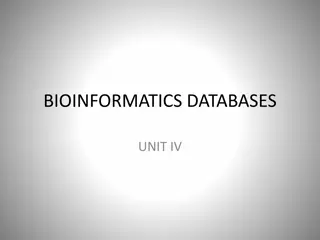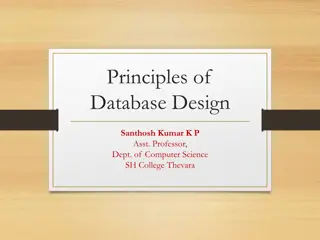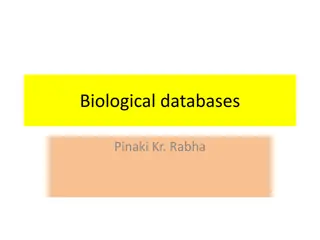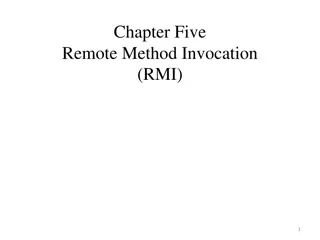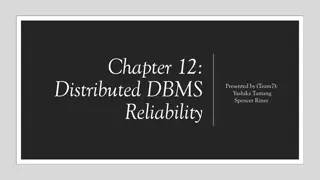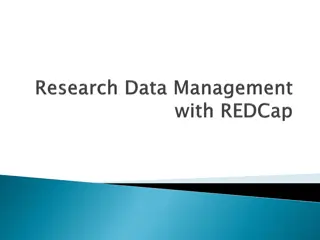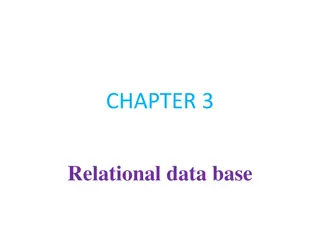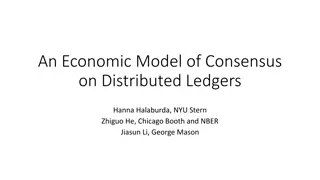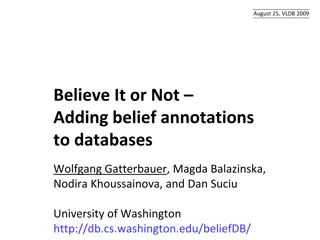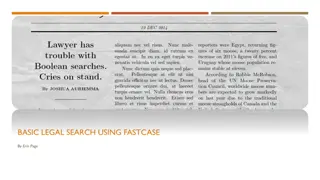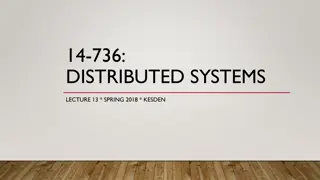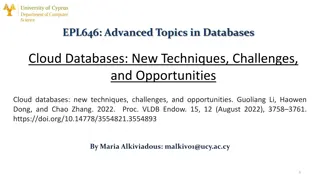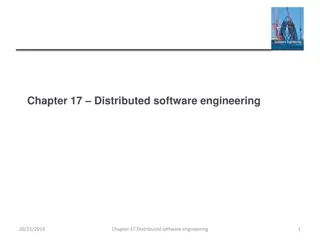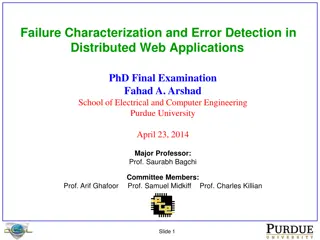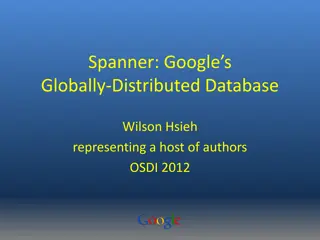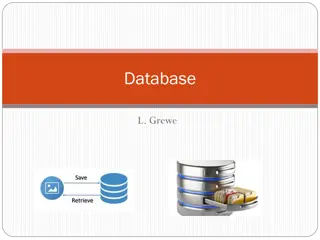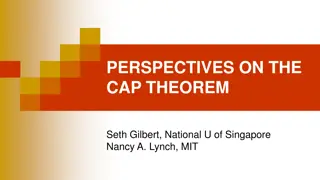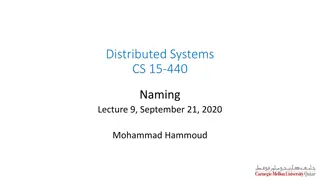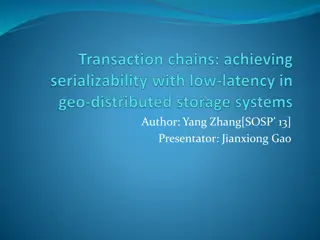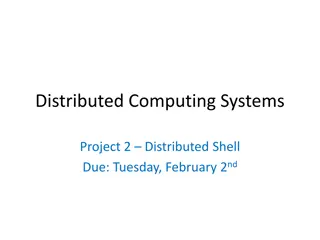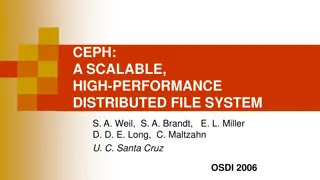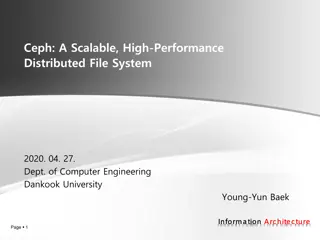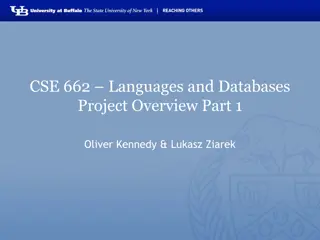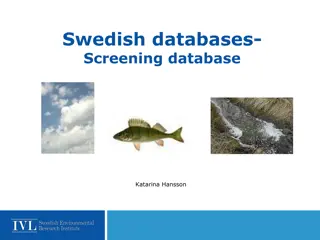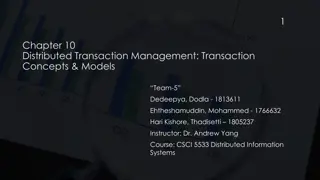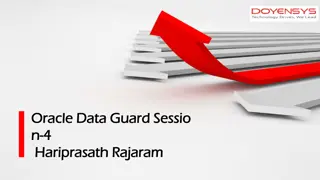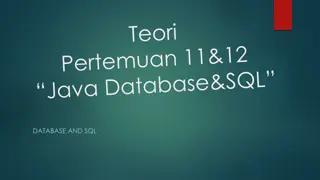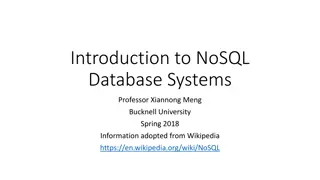Revolutionizing Data Management with HTAP Databases
Organizations handle a vast amount of data daily, necessitating efficient systems like Hybrid Transactional Analytical Processing (HTAP). This advanced system streamlines online transaction processing (OLTP) and analytical processing (OLAP), enabling real-time insights and prompt actions. HTAP datab
2 views • 22 slides
Overview of Distributed Systems: Characteristics, Classification, Computation, Communication, and Fault Models
Characterizing Distributed Systems: Multiple autonomous computers with CPUs, memory, storage, and I/O paths, interconnected geographically, shared state, global invariants. Classifying Distributed Systems: Based on synchrony, communication medium, fault models like crash and Byzantine failures. Comp
9 views • 126 slides
Understanding Databases and Database Applications
Databases are collections of related data used to store known facts with implicit meanings in a structured manner. A Database Management System (DBMS) is crucial in managing databases efficiently by defining structures, loading data, manipulating content, ensuring security, and facilitating data acc
1 views • 15 slides
Introduction to Enterprise Databases for GIS Professionals
Explore the world of enterprise databases through a GIS perspective with a focus on concurrent clients, database administration, creating databases/tables, checking service names, unique features, numeric data types, data type parameters in ArcGIS, and character data types. Gain insights into managi
0 views • 52 slides
Exploring the World of Bioinformatics Databases
Bioinformatics databases are essential tools in handling molecular biological data, classified into sequence and structure databases. Primary databases store raw data, while secondary databases contain curated information for research. Examples include GenBank, Protein Data Bank, and SWISS-Prot.
1 views • 38 slides
Database Design Principles and Management Overview
This document presents an overview of database design principles, including structured, semi-structured, and unstructured data types. It delves into the role of Database Management Systems (DBMS) in defining, constructing, manipulating, and sharing databases effectively. It also covers various types
0 views • 47 slides
Understanding Parallel and Distributed Computing Systems
In parallel computing, processing elements collaborate to solve problems, while distributed systems appear as a single coherent system to users, made up of independent computers. Contemporary computing systems like mobile devices, IoT devices, and high-end gaming computers incorporate parallel and d
1 views • 11 slides
An Overview of Biological Databases in Bioinformatics
Biological databases play a crucial role in bioinformatics, storing vast amounts of data related to nucleotide sequences, protein sequences, and more. These databases are publicly accessible and essential for research in biological fields. Primary databases, such as GenBank, EMBL, and DDBJ, contain
0 views • 13 slides
Understanding Remote Method Invocation (RMI) in Distributed Systems
A distributed system involves software components on different computers communicating through message passing to achieve common goals. Organized with middleware like RMI, it allows for interactions across heterogeneous networks. RMI facilitates building distributed Java systems by enabling method i
1 views • 47 slides
Distributed DBMS Reliability Concepts and Measures
Distributed DBMS reliability is crucial for ensuring continuous user request processing despite system failures. This chapter delves into fundamental definitions, fault classifications, and types of faults like hard and soft failures in distributed systems. Understanding reliability concepts helps i
0 views • 58 slides
Understanding Data Management and Databases
Explore the concepts of data, information, and knowledge, learn why databases are superior to spreadsheets for data storage, and delve into the organization and functionality of relational databases for decision-making purposes.
0 views • 18 slides
Understanding the Importance of Databases for Research Data Management
Databases play a crucial role in research data management by allowing systematic organization, easy data entry, manipulation, and analysis. They enable storing and accessing data efficiently, ensuring data integrity and security, and facilitating complex queries and associations that are not possibl
0 views • 58 slides
Understanding Relational Databases and File-Based Systems
This chapter delves into the fundamental concepts of databases, comparing them to file-based systems, and highlighting the significance of relational databases in modern integrated AISs. It explores the difference between logical and physical views of databases, introduces key concepts such as DBMS
0 views • 70 slides
Understanding White Spaces Databases: An Empirical Study
White spaces in the TV band offer opportunities for unlicensed usage, motivating research on white space detection methods like geolocation spectrum databases and spectrum sensing. This study explores errors in white spaces databases, discussing the challenges and implications for white space device
2 views • 30 slides
Economic Models of Consensus on Distributed Ledgers in Blockchain Technology
This study delves into Byzantine Fault Tolerance (BFT) protocols in the realm of distributed ledgers, exploring the complexities of achieving consensus in trusted adversarial environments. The research examines the classic problem in computer science where distributed nodes communicate to reach agre
0 views • 34 slides
Distributed Algorithms for Leader Election in Anonymous Systems
Distributed algorithms play a crucial role in leader election within anonymous systems where nodes lack unique identifiers. The content discusses the challenges and impossibility results of deterministic leader election in such systems. It explains synchronous and asynchronous distributed algorithms
2 views • 11 slides
Managing Belief Annotations in Databases: A Modal Logic Approach
Explore the concept of belief databases that enable data curation based on modal and default logic in a relational model. The work discusses managing inconsistent views in community databases and presents a motivating application scenario to illustrate the challenges and solutions in handling belief
0 views • 34 slides
Understanding Databases and Search Methods in Legal Research
Dive into the basics of legal search using Fastcase, exploring the concept of databases, integrated vs. non-integrated content, indexed and full-text databases, along with examples and the benefits of natural language searching in legal research. Gain insights on the types of databases, how informat
0 views • 20 slides
Understanding Stored and Inherited Relations in Relational Databases
Explore the concept of Stored and Inherited Relations (SIR) in relational databases, as discussed by Witold Litwin at Dauphine University. Discover how a typical scheme of a stored relation defines a natural SIR, leading to more efficient query formulations and less procedural querying processes. Le
0 views • 27 slides
Overview of Distributed Systems, RAID, Lustre, MogileFS, and HDFS
Distributed systems encompass a range of technologies aimed at improving storage efficiency and reliability. This includes RAID (Redundant Array of Inexpensive Disks) strategies such as RAID levels, Lustre Linux Cluster for high-performance clusters, MogileFS for fast content delivery, and HDFS (Had
0 views • 23 slides
Emerging Trends in Cloud Databases: Challenges and Opportunities
Cloud databases have revolutionized data management, offering scalability and efficiency. This article explores new techniques in cloud-native databases, challenges faced in cloud DBs, and the architecture of Cloud OLTP and OLAP systems. It delves into the significance of OLTP and OLAP in different
0 views • 25 slides
Understanding Advanced Databases and Online Analytical Processing
Explore the world of data warehousing, advanced databases, OLTP, and OLAP with Dr. Nicholas Gibbins. Learn about traditional processing styles, multidimensional databases, and the dynamic analysis techniques of Online Analytical Processing (OLAP). Understand the importance of asking "what if" questi
0 views • 33 slides
Distributed Software Engineering Overview
Distributed software engineering plays a crucial role in modern enterprise computing systems where large computer-based systems are distributed over multiple computers for improved performance, fault tolerance, and scalability. This involves resource sharing, openness, concurrency, and fault toleran
0 views • 66 slides
Challenges in Detecting and Characterizing Failures in Distributed Web Applications
The final examination presented by Fahad A. Arshad at Purdue University in 2014 delves into the complexities of failure characterization and error detection in distributed web applications. The presentation highlights the reasons behind failures, such as limited testing and high developer turnover r
0 views • 53 slides
Google Spanner: A Distributed Multiversion Database Overview
Represented at OSDI 2012 by Wilson Hsieh, Google Spanner is a globally distributed database system that offers general-purpose transactions and SQL query support. It features lock-free distributed read transactions, ensuring external consistency of distributed transactions. Spanner enables property
0 views • 27 slides
Understanding Database Management Systems and Data Storage
Explore the world of Database Management Systems (DBMS) and learn about the evolution of data storage from flat-file to relational databases. Discover the key features of a DBMS, different database types, administration tools, SQL and NoSQL databases, CAP theory, and considerations for choosing betw
0 views • 32 slides
Understanding the CAP Theorem in Distributed Systems
The CAP Theorem, as discussed by Seth Gilbert and Nancy A. Lynch, highlights the tradeoffs between Consistency, Availability, and Partition Tolerance in distributed systems. It explains how a distributed service cannot provide all three aspects simultaneously, leading to practical compromises and re
0 views • 28 slides
Understanding Distributed Hash Table (DHT) in Distributed Systems
In this lecture, Mohammad Hammoud discusses the concept of Distributed Hash Tables (DHT) in distributed systems, focusing on key aspects such as classes of naming, Chord DHT, node entities, key resolution algorithms, and the key resolution process in Chord. The session covers various components of D
0 views • 35 slides
Distributed Database Management and Transactions Overview
Explore the world of distributed database management and transactions with a focus on topics such as geo-distributed nature, replication, isolation among transactions, transaction recovery, and low-latency maintenance. Understand concepts like serializability, hops, and sequence number vectors in ma
0 views • 17 slides
Distributed Computing Systems Project: Distributed Shell Implementation
Explore the concept of a Distributed Shell in the realm of distributed computing systems, where commands can be executed on remote machines with results returned to users. The project involves building a client-server setup for a Distributed Shell, incorporating functionalities like authentication,
0 views • 14 slides
Overview of Ceph Distributed File System
Ceph is a scalable, high-performance distributed file system designed for excellent performance, reliability, and scalability in very large systems. It employs innovative strategies like distributed dynamic metadata management, pseudo-random data distribution, and decoupling data and metadata tasks
0 views • 42 slides
Overview of Ceph: A Scalable Distributed File System
Ceph is a high-performance distributed file system known for its excellent performance, reliability, and scalability. It decouples metadata and data operations, leverages OSD intelligence for complexity distribution, and utilizes adaptive metadata cluster architecture. Ceph ensures the separation of
0 views • 23 slides
Database Benchmarking: Embedded Databases Comparison
This project involves benchmarking lightweight embedded databases like SQLite, BerkeleyDB, and others. Students will evaluate and compare these databases using specific workloads to analyze their performance. The outcomes include a detailed report on each system's strengths and weaknesses. Required
0 views • 19 slides
Environmental Monitoring and Screening Databases in Sweden
This content delves into the monitoring and screening databases managed by Katarina Hansson at IVL, focusing on chemicals, emissions, and national environmental data in Sweden. It covers the use of national databases, biota databases for pollutants in biological samples, and screening studies involv
0 views • 10 slides
Distributed Transaction Management in CSCI 5533 Course
Exploring transaction concepts and models in distributed systems, Team 5 comprising Dedeepya, Dodla, Ehtheshamuddin, and Hari Kishore under the guidance of Dr. Andrew Yang delve into the intricacies of distributed transaction management in CSCI 5533 Distributed Information Systems.
0 views • 56 slides
Oracle Data Guard: Training Objectives and Far Sync Instances
This content highlights training objectives for Oracle Data Guard, focusing on the new features such as Far Sync Instances and Active Standby Databases. It covers configuring Data Guard Broker, plugging Pluggable Databases, recovering Standby Databases, and achieving a highly available Oracle Databa
0 views • 25 slides
Understanding Databases and SQL: A Comprehensive Overview
Databases are fundamental in computer-based record-keeping systems, essential for organizations to maintain and access crucial information efficiently. This comprehensive guide covers the significance of databases, advantages of centralized databases, database models, relational databases, and more.
0 views • 52 slides
Understanding NoSQL Databases in Modern Data Management
NoSQL databases offer innovative storage and retrieval mechanisms for diverse data types, deviating from traditional relational databases. This article explores the history, definition, advantages, challenges, and types of NoSQL databases, shedding light on their pivotal role in current data managem
0 views • 11 slides
Concurrency Control and Coordinator Election in Distributed Systems
This content delves into the key concepts of concurrency control and coordinator election in distributed systems. It covers classical concurrency control mechanisms like Semaphores, Mutexes, and Monitors, and explores the challenges and goals of distributed mutual exclusion. Various approaches such
0 views • 48 slides
Quantum Distributed Proofs for Replicated Data
This research explores Quantum Distributed Computing protocols for tasks like leader election, Byzantine agreement, and more. It introduces Quantum dMA protocols for verifying equality of replicated data on a network without shared randomness. The study discusses the need for efficient protocols wit
0 views • 28 slides
